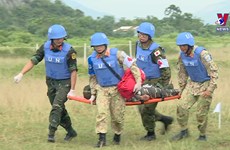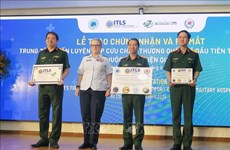Measures sought to increase social organisations’ role in public health
A conference was held in Hanoi on September 18 to discuss the enhancement of the role and initiatives of social organisations in caring for public health.
 Illustrative image (Source: VNA)
Illustrative image (Source: VNA)Hanoi (VNA) – A conference was held in Hanoi on September 18 to discuss the enhancement of the role and initiatives of social organisations in caring for public health.
Dr. Pham Van Tan, Vice President and Secretary General of the Vietnam Union of Science-Technology Associations (VUSTA), said public health care has received special attention from the Party and State.
However, there are still many problems in the sector, including inadequate attention to the mobilisation of social resources and well as the promotion of social organisations and the private sector in the field, Tan said.
He hoped the conference will help connect social organisations and State agencies in caring for public health, while seeking solutions and policy recommendations to enhance the engagement and contributions of social organisations in the work.
Meanwhile, Do Thi Van, Director of the Non-governmental Organisations-Information Centre (NGO-IC)cited a VUSTA report showing the union’s member social organisations mobilized about 1.23 trillion VND, including 213 non-Government aided projects and more than 32 million USD in 11 official development assistance (ODA) projects, mostly in public health and environmental protection for ethnic minorities and vulnerable groups.
She said that despite their strength in wide networks, experts and creativity, social associations have faced difficulties in connections with each other and partners, as well as an incomplete legal environment.
In the future, VUSTA should strengthen its role in connecting and promoting the associations’ engagement in public health and environment projects, while giving recommendations to State agencies on completing policies to ensure equality in accessing State funds.
Dao LanHuong from the World Bank in Vietnam said the malnutrition ratio in Vietnam has reduced considerably in the past two decades, but the ratio among ethnic minority groups is always higher than those from the majority Kinh group.
She explained that ethnic minority people accounted for 73 percent of the poor community in 2016, adding that obstacles in language are the major difficulty in connecting public health service providers with ethnic minorities.
She stressed the need to define nutrition for ethnic minorities as a priority.
At the conference, held by VUSTA and NGO-IC, participants also shared effective models and initiatives in improving public health and environment, as well as ways to enhance efficiency of social organisations in the field./.













